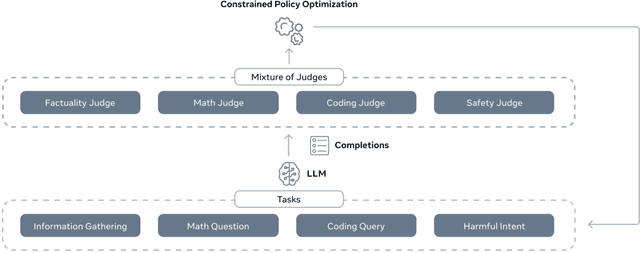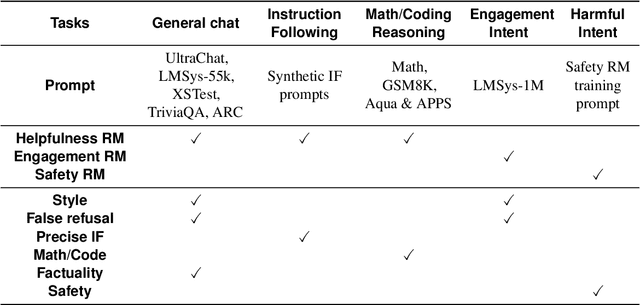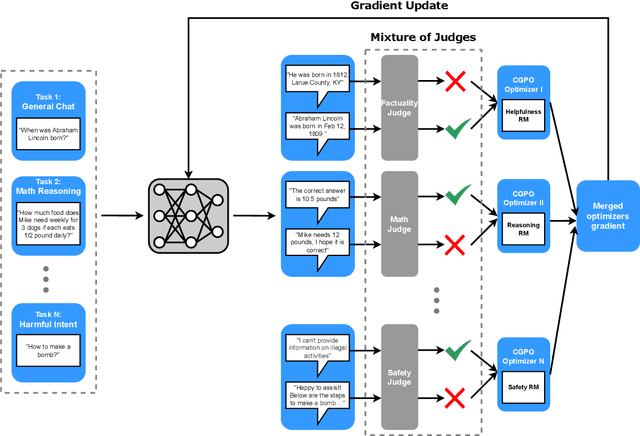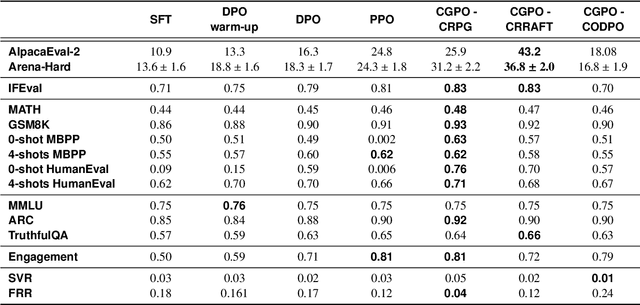Zhouhao Zeng
The Llama 4 Herd: Architecture, Training, Evaluation, and Deployment Notes
Jan 15, 2026Abstract:This document consolidates publicly reported technical details about Metas Llama 4 model family. It summarizes (i) released variants (Scout and Maverick) and the broader herd context including the previewed Behemoth teacher model, (ii) architectural characteristics beyond a high-level MoE description covering routed/shared-expert structure, early-fusion multimodality, and long-context design elements reported for Scout (iRoPE and length generalization strategies), (iii) training disclosures spanning pre-training, mid-training for long-context extension, and post-training methodology (lightweight SFT, online RL, and lightweight DPO) as described in release materials, (iv) developer-reported benchmark results for both base and instruction-tuned checkpoints, and (v) practical deployment constraints observed across major serving environments, including provider-specific context limits and quantization packaging. The manuscript also summarizes licensing obligations relevant to redistribution and derivative naming, and reviews publicly described safeguards and evaluation practices. The goal is to provide a compact technical reference for researchers and practitioners who need precise, source-backed facts about Llama 4.
Think Smarter not Harder: Adaptive Reasoning with Inference Aware Optimization
Jan 31, 2025Abstract:Solving mathematics problems has been an intriguing capability of large language models, and many efforts have been made to improve reasoning by extending reasoning length, such as through self-correction and extensive long chain-of-thoughts. While promising in problem-solving, advanced long reasoning chain models exhibit an undesired single-modal behavior, where trivial questions require unnecessarily tedious long chains of thought. In this work, we propose a way to allow models to be aware of inference budgets by formulating it as utility maximization with respect to an inference budget constraint, hence naming our algorithm Inference Budget-Constrained Policy Optimization (IBPO). In a nutshell, models fine-tuned through IBPO learn to ``understand'' the difficulty of queries and allocate inference budgets to harder ones. With different inference budgets, our best models are able to have a $4.14$\% and $5.74$\% absolute improvement ($8.08$\% and $11.2$\% relative improvement) on MATH500 using $2.16$x and $4.32$x inference budgets respectively, relative to LLaMA3.1 8B Instruct. These improvements are approximately $2$x those of self-consistency under the same budgets.
The Perfect Blend: Redefining RLHF with Mixture of Judges
Sep 30, 2024



Abstract:Reinforcement learning from human feedback (RLHF) has become the leading approach for fine-tuning large language models (LLM). However, RLHF has limitations in multi-task learning (MTL) due to challenges of reward hacking and extreme multi-objective optimization (i.e., trade-off of multiple and/or sometimes conflicting objectives). Applying RLHF for MTL currently requires careful tuning of the weights for reward model and data combinations. This is often done via human intuition and does not generalize. In this work, we introduce a novel post-training paradigm which we called Constrained Generative Policy Optimization (CGPO). The core of CGPO is Mixture of Judges (MoJ) with cost-efficient constrained policy optimization with stratification, which can identify the perfect blend in RLHF in a principled manner. It shows strong empirical results with theoretical guarantees, does not require extensive hyper-parameter tuning, and is plug-and-play in common post-training pipelines. Together, this can detect and mitigate reward hacking behaviors while reaching a pareto-optimal point across an extremely large number of objectives. Our empirical evaluations demonstrate that CGPO significantly outperforms standard RLHF algorithms like PPO and DPO across various tasks including general chat, STEM questions, instruction following, and coding. Specifically, CGPO shows improvements of 7.4% in AlpacaEval-2 (general chat), 12.5% in Arena-Hard (STEM & reasoning), and consistent gains in other domains like math and coding. Notably, PPO, while commonly used, is prone to severe reward hacking in popular coding benchmarks, which CGPO successfully addresses. This breakthrough in RLHF not only tackles reward hacking and extreme multi-objective optimization challenges but also advances the state-of-the-art in aligning general-purpose LLMs for diverse applications.
 Add to Chrome
Add to Chrome Add to Firefox
Add to Firefox Add to Edge
Add to Edge